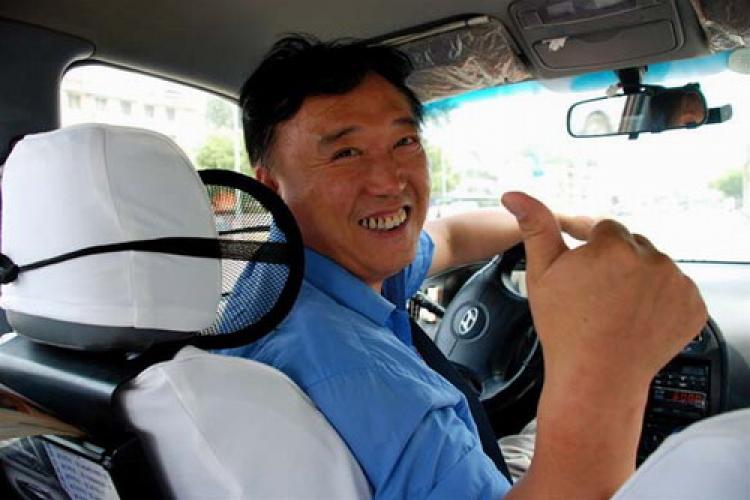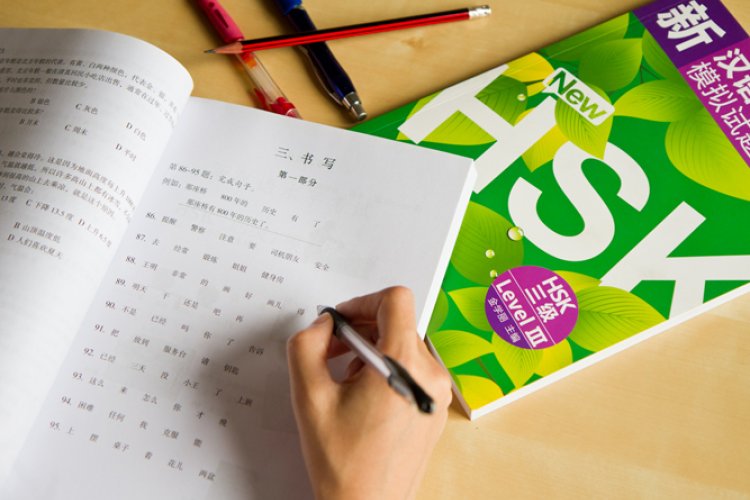Mandarin Month: How to Make Friends With Your Taxi Driver (and Avoid Scams)
In the lead up to our Mandarin Month mixer on June 24 June 25, where you'll be able to meet with Beijing's best Mandarin schools, we'll be dishing out some language-learning advice on a daily basis. Read on if you don't want to wait to get started on improving your 中文. Mandarin Month is sponsored by Sanfine International Hospital.
The most convenient way to get around Beijing is by taxi (出租车 chūzūchē) thanks to the abundance of yellow cabs on the roads and taxi apps like Didi at your fingertips, which now has an English version. Yes, you might get caught in rush hour on the Third Ring Road if you are not careful, but at least you can serenade your taxi driver with Chinese pop songs instead of being squished on a stuffy and smelly subway carriage.
If you decide to hail a standard Beijing taxi (出租车 chūzūchē) off the street, make sure you pick an official taxi with a yellow stripe, a license plate that starts with “京B”, and the correct taxi license on the front passenger’s side. Even if you prefer to hail a standard taxi or a private car (快车 kuàichē) the app, your driver’s English skills are likely to be limited. However, they still like to add to the fun by calling you and asking in rapid-fire Chinese exactly where you are. Despite the extremely accurate GPS on the app, they always like to double check – "你在哪儿上车? nǐ zài nǎr shàngchē? Where are you?" – how considerate …
After flagging down a taxi
Taxi drivers will ask you where you want to go (你要去哪儿?nǐ yào qù nǎr?), to which you can either show them the address written down in Chinese characters or tell them in your best Chinese!
我要去(那个)地方。wǒ yào qù (nàgè) dìfāng.
我们要先去(这里)然后去(那里)。wǒmen yào xiānqù (zhèlǐ) ránhòu qù (nàlǐ).
While Didi’s private cars usually runs on a meter via the app (and you can pay both using Alipay (支付宝 zhīfùbǎo) or WeChat Pay (微信支付 wēixìn zhīfù)), the standard taxis should run the standard taxi meter, but always ask your driver to turn on the meter (请打表 qǐng dǎbiǎo).
Potential scams
Even some legitimate-looking taxis may be fake or have secret buttons (among other scams, see below) that let them increase the meters without you knowing!
We wouldn’t recommend getting into unlicensed taxis, which usually charge a fixed price for getting your destination, double their price if they see a foreigner or add extra ‘airport charges,’ which don’t exist (but passengers have to pay road tolls).
Sometimes, even licensed taxis will try to fleece foreigners by switching notes without you realizing or getting aggressive in order to make you leave after you have realized. Usually, they will start to shout and get angry, saying your note is too old (太旧 tàijiù) and demand another note instead. This means he has probably switched your note already and the one he is waving at you is a fake. The best thing for your wallet is probably to get out the car and let him keep your money, instead of taking the fake note and giving him another real note. Or if you are unsure, you can alternatively demand a receipt (小票 xiǎo piào), take a photo of his licence plate and taxi license, and then report him to the police and his taxi company.
Sometimes the best way to try and not be fleeced out of your money is to make friends with the taxi driver. Almost like the British people in awkwardness talking to strangers and dislike of meeting new people, you have to use some classic ice breakers to try to warm him up to you as a laowai.
Make small talk like a true Beijinger
Like any true Beijinger, complain about the distinct characteristics of Beijing life: traffic, pollution or weather.
Oh man, the streets are so busy every day!
哎呀,每天路上有很多车!
āi ya, měi tiān lùshàng yǒu hěnduō chē!
The pollution is so bad, I never see the blue skies!
欸,污染一直很严重,我没见过蓝天!
ě, wūrǎn yīzhí hěn yánzhòng, wǒ méi jiànguò lántiān!
Damn it, today is so hot!
太糟了!今天好热啊!
tài zāo le! jīntiān hǎo rè ā!
Ask about their life, their family, where are they from? How long have you been a taxi driver?
Driver, how long have you been working?
师傅,你工作多长时间了?
shīfù, nǐ gōngzuò duōzhǎng shíjiān le?
Do you enjoy your work?
你喜欢你的工作吗?
nǐ xǐhuān nǐde gōngzuò ma?
Are you a Beijinger? Are you from Hebei Province?
你是北京人吗?你来自河北省吗?
nǐ shì běijīngrén ma? nǐ láizì héběishěng ma?
Do you like living in Beijing?
你喜欢住在北京吗?
nǐ xǐhuān zhù zài běijīng ma?
Do you have children?
你有孩子吗?
nǐ yǒu háizǐ ma?
Do you speak English etc.? Do you have an English name?
Do you speak English?
你会说英语吗?
nǐ huìshuō yīngyǔ ma?
A little? I also speak a little bit of Mandarin!
一点吗?我也会说一点汉语!
yīdiǎn ma ?wǒ yě huìshuō yīdiǎn hànyǔ!
Do you have an English name?
你有英文名字吗?
nǐ yǒu yīngwén míngzì ma?
Have you been to America/Britain/Australia/France/Germany?
你去过美国/英国/澳大利亚/法国/德国吗?
nǐ qùguò měiguó / yīngguó / àodàlìyà / fǎguó / déguó ma?
Talk about alcohol.
I only drank a little bit of beer/baijiu/wine.
我只喝了一点啤酒/白酒/葡萄酒!
wǒ zhī hēle yīdiǎn píjiǔ / báijiǔ / pútáojiǔ!
Do you also like to drink>
你也喜欢喝酒吗?
nǐ yě xǐhuān hējiǔ ma?
Do you drink baijiu every evening? You're so strong/skilled!
你每天晚饭喝白酒吗?你很厉害!
nǐ měitiān wǎnfàn hē báijiǔ ma? nǐ hěn lìhài!
I would rather drink beer, baijiu is too concentrated.
我宁可喝啤酒,白酒太浓了!
wǒ níngkě hē píjiǔ, báijiǔ tài nóng le!
Ask for some music, sing some Chinese songs to impress them.
I like to listen to music, could you please turn on the music?
我想听音乐,请你打开收音机可以吗?
wǒ xiǎngtīng yīnyuè, qǐngnǐ dǎkāi shōuyīnjī kěyǐ ma?
Do you have that song "peng you" or "xiao pingguo"?
你有没有(朋友/小苹果)的歌?
nǐ yǒuméiyǒu (péngyǒu / xiǎopíngguǒ) de gē?
Stop talking, I want to sing!
别说了,我要唱歌!
bié shuō le, wǒ yào chànggē!
Keep on track with your studies with all of our 2017 Mandarin Month content here, and don't forget to register for our June 24 June 25 mixer here.
If you are interested in becoming a sponsor of 2017 Mandarin Month or an exhibitor at the Mandarin Month Mixer of June 24 June 25, please call 5941 0368 or contact us via sales@truerun.com. For media partnership opportunities, please call 5941 5379 or contact us via marketing@truerun.com.
Photo: the Beijinger







